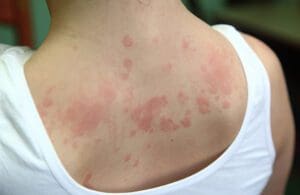
[Image courtesy of Pol Maria via Adobe Stock]
In a cohort of the study based in the Swiss canton of Vaud, 90% of people who received the mRNA-based Moderna COVID-19 booster and developed new-onset hives had the Moderna vaccine beforehand. In a nationwide cohort, 81% of those with new-onset hives received the vaccine first.
The individuals with CSU in the study waited roughly three months for the condition to resolve.
The research was published in JAMA Network Open.
Overview of the Swiss study
The incidence of CSU after a booster dose was 1.9 to 2.1 per 100,000 doses of the Pfizer-BioNTech vaccine and 30.8 to 43.9 per 100,000 doses of Moderna’s product.
The study authors are uncertain why the Moderna COVID-19 booster appears more strongly associated with CSU than the Pfizer-BioNTech vaccine.
The authors note that the reasons for this association are unclear but may relate to the higher dose of mRNA in the Moderna vaccine. In addition, they had previously reported that the Moderna vaccine had a stronger association with positive skin and basophil activation test results than the Pfizer-BioNTech vaccine, which may be associated with CSU in predisposed individuals.
Guidelines for mRNA-based boosters?
The JAMA study does not discourage COVID vaccination but does recommend creating new guidelines for eligibility and dosing for mRNA-based boosters for patients with CSU after receiving an mRNA-based COVID-19 vaccine.
The Vaccine Adverse Event Reporting System (VAERS) also notes a number of cases of CSU associated with the first-generation Moderna vaccine. Out of 415,506 adverse event reports, there were 142 reports of chronic spontaneous urticaria and 13,423 events categorized as ‘urticaria’ alone. Injection site urticaria and mechanical urticaria were also common. There were 1,201 reports of the former and 841 reports of the latter.
A research letter published in JAMA Dermatology in 2021 noted 776 cutaneous reactions in recipients of the first dose of the COVID-19 vaccine in almost 50,000 healthcare employees.
Filed Under: Dermatology, Infectious Disease





Tell Us What You Think!
You must be logged in to post a comment.